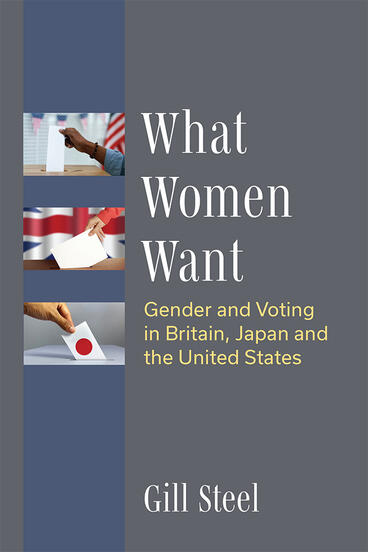What Women Want
Gender and Voting in Britain, Japan and the United States
Women vote their own minds
Description
What Women Want analyzes decades of voting preferences, values, and policy preferences to debunk some of the media and academic myths about gender gaps in voting and policy preferences. Findings show that no single theory explains when differences in women’s and men’s voting preferences emerge, when they do not, or when changes—or the lack thereof—occur over time. Steel extends existing theories to create a broader framework for thinking about gender and voting behavior to provide more analytical purchase in understanding gender and its varying effects on individual voters’ preferences. She incorporates the long-term effects of party identification and class politics on political decision-making, particularly in how they influence preferences on social provision and on expectations of the state. She also points to the importance of symbolic politics
Gill Steel is Professor of Political Science in the Institute for the Liberal Arts at Doshisha University
Reviews
“With meticulous data analysis, Gill Steel’s What Women Want elucidates the complexity of gender politics operating not only in election campaigns but also in voting analysis. This rigorous study confirms the importance of learning from the enthralling fruits that the fine art of quantitative analysis can offer.”
- Hiroko Takeda
—Hiroko Takeda, Nagoya University
“This meticulously researched, incisive book makes a powerful case for the importance of gender in understanding and explaining voting behavior, even as it eludes any easy simplifications of women’s (and men’s) interests, values, and goals. Gill Steel offers a complex but clearly-argued account that will set a new standard for comparative analysis in this arena.”
- David Leheny
—David Leheny, Waseda University
“Gill Steel combines careful quantitative analysis of long-term, high-quality surveys of voting behavior in three advanced democracies with detailed ethnographic reporting and focus group discussions to demolish the notion that there is an inherent ‘gender gap’ between the policy preferences and partisan allegiances of men and women.”
- Gregory W. Noble
—Gregory W. Noble, University of Tokyo
“Steel demystifies the old and modern versions of gender gaps in voting brilliantly. Women are neither more conservative nor more progressive than men and thus do not constitute a bloc of swing votes, as was often assumed. Yet, the symbolic politics of gender casts a shadow on campaign strategy and media coverage. This book’s clear writing backed by ample evidence and rich data deepens our understanding as to how gender really matters in elections.”
- Mari Miura
—Mari Miura, Sophia University
“This book is chock-full of great data and represents a timely contribution to political science. Steel’s voice is hip, and especially well-suited for the newcomer to politics seeking a solid introduction to the intersection of gender and electoral politics across three distinct democracies. Experts alike will benefit from Steel’s comparative analysis.”
- Dyron Dabney
—Dyron Dabney, Earlham College
“This well-researched, well-written book draws on an impressive variety of evidence to make an important contribution to our understanding of the ‘gender gap’ in voting. This book has much to teach readers about the relationship between gender and forces like class, symbolic politics, the media, and political campaigns.”
- Michael Strausz
—Michael Strausz, Texas Christian University
"Steel's findings unsettle easy assumptions about women's voting behavior and remind readers of the complexities of voter analysis."
- J. G. Everett, University of Colorado at Denver
—Choice

